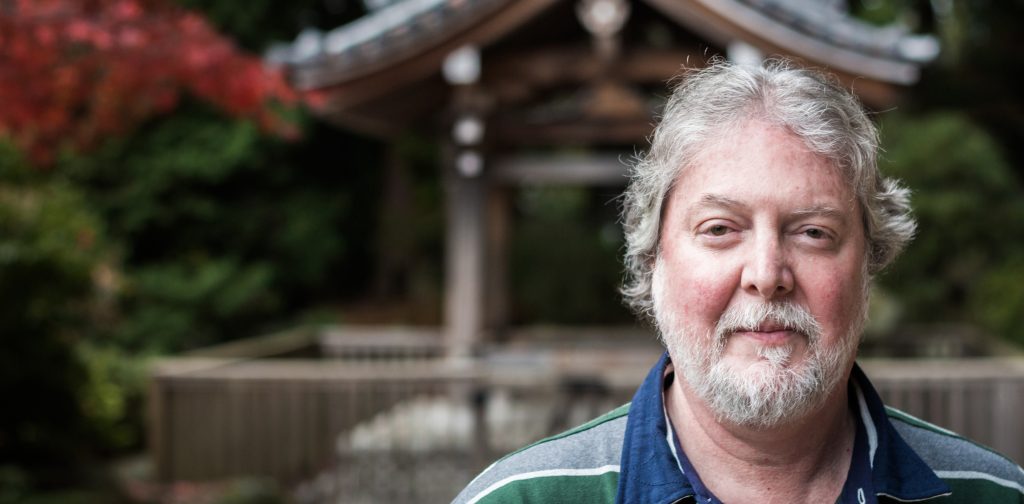On October 8, more than fifty scholars from across the university, as well as members of the community beyond UBC, gathered to celebrate Dr. Joshua Mostow’s election as a Fellow of the Royal Society of Canada. Established in 1882, the Royal Society of Canada (http://www.rsc-src.ca/) recognizes Canada’s foremost scholars, artists, and scientists. Dr. Mostow was one of two UBC scholars in the humanities to be inducted over the past five years and he is the only Japanese literary specialist to join the RSC.
Video:[youtube]https://youtu.be/91UU3sqSa4E[/youtube]
Recognized for his achievements in the study of literature, reception, and visual culture, Dr. Mostow’s election to Canada’s National Academy brings greater attention to the study of Japan and Asia, and to literary traditions outside Europe and North America.
Tributes to Dr. Mostow and his scholarly contributions were offered by Dean Gage Averill, Deputy Consul-General Akira Uchida, Centre for Japanese Research Co-director Christina Laffin, Asian Studies Head Ross King, and University of Alberta Associate Professor Anne Commons. Letters of congratulations from colleagues and ex-students across the globe were read at the event or shown as video recordings.
The celebration was hosted by Asian Studies, the Faculty of Arts, the Institute of Asian Research, and the Centre for Japanese Research. Thank you to all who joined us for the festivities! We look forward to Dr. Mostow’s ongoing promotion of study on Japan, following the mandate of the RSC to promote learning and research in the arts, the humanities, and the natural and social sciences.
CiTR’s Arts on Air: Interview with Joshua Mostow
On October 23rd, Ira Nadel sat down with Professor Joshua Mostow. The interview dives into Mostow’s early interest in Asian studies, his ongoing research and new show at the Royal Ontario Museum. Listen online.
Faculty of Arts Interview
Originally published on arts.ubc.ca.
Associate Head and Professor in Department of Asian Studies, Dr. Joshua Mostow recently added a new honour to his list of accomplishments: Fellow of the Royal Society of Canada. The Faculty of Arts spoke with Dr. Mostow about how he chose his field, the convergence of classical and contemporary Japanese art, and the most exciting discovery of his career.


In 9th-11th century Japan, anyone who’s writing in Japanese is a woman. It seems weird to say, but until 20-something years ago, people didn’t pay attention to the fact that the writers were women.
I did my PhD in comparative literature and literary theory, and in that day, literary theory meant chiefly structuralism, semiotics, some deconstruction, things like that. Feminist approaches were not a big part of it. Then I went to Japan to do dissertation research for almost three years, and when I came back to North America, the landscape had changed; feminist criticism was much stronger. And I looked at the kind of literature I was studying, which in fact was written mostly by women, and I thought, “Oh! Maybe this has something to say to me.” So that got me started on researching feminist criticism.
Your research has taken you around North America, Asia and Europe. How has where you conducted your research informed your perspective?
Studying a national literature in the nation and outside the nation are obviously very different things. There are a lot of people in Japan doing Japanese literature of any period, so the focus tends to be very narrow, whereas we have to be rather broad. For instance, we often teach survey courses; literature in translation that might go from the 8th century to the 18th century. That kind of course doesn’t have any parallel in Japan.
For people outside of Japan, I think there’s also a greater willingness to consider other aspects like manga or anime, which don’t play a great role in the education system in Japan. The Japanese government is very big into using Japanese popular culture as a kind of soft power, but in fact, it’s much more subculture-like in Japan than people from the outside would assume.
And then of course, being in a multicultural environment like Vancouver has a real impact on one’s teaching, because it’s not easy to say, “Well, we think such-and-such.” Because you’re never really sure who “we” are; that is, you and the people in the classroom. So I think it makes one more sensitive to the possibility of different viewpoints, different approaches. And Europe has its own tradition, which is still very strongly philologically-based. It’s also more comparative, just because people are nauseatingly polyglot there. They speak a number of languages and so have been educated in the literatures of more than one culture, and tend to be able to make connections more readily.


